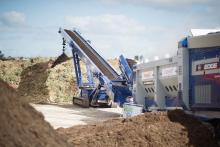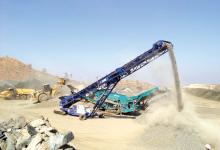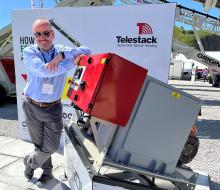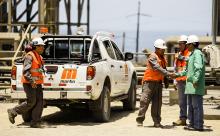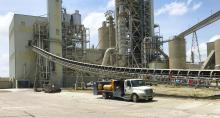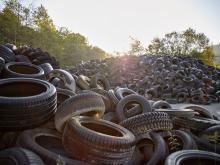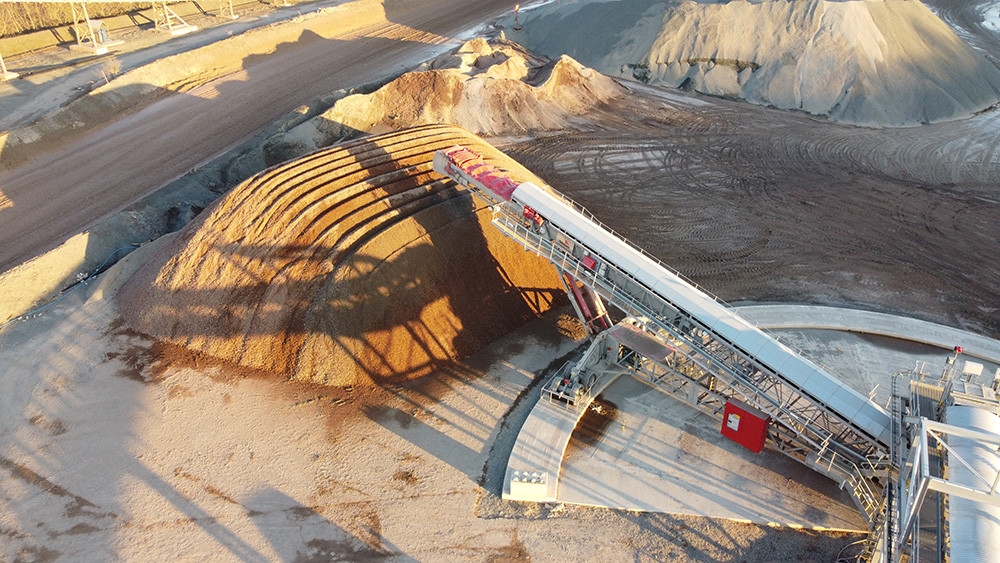
Telestack is renowned in the global aggregates market for its bulk-conveying innovations that improve customers’ quarrying operations. One example is the introduction of the 'Self-Driving' smart stockpiling solution, found in the Omagh, County Tyrone, Northern Ireland-headquartered manufacturer’s radial telescopic-conveying range. By deploying technology and experience, this advanced, autonomous stockpiling solution aims to maximise returns within any operation, ensuring operational efficiency, improved site safety, reduced operational overheads and complexity, and a quality in-spec 'blended' product.
The Telestack radial telescopic-conveyor range has a proven record of performance and reliability operating in a range of aggregate applications around the globe. The mobility options of the unit allow the operator to utilise this technology anywhere on site, ensuring a high-production capacity and 30% more stockpile capacity on the same footprint when compared to fixed length/height conveyors. Once set up, the smart system can be operated locally by an operator or remotely using the smart onboard PLC (programmable logical controller) to feed information back to the remote-central-control station. Once the unit's physical constraints are established, the unit can work independently using the pre-programmed parameters determined in the set-up.
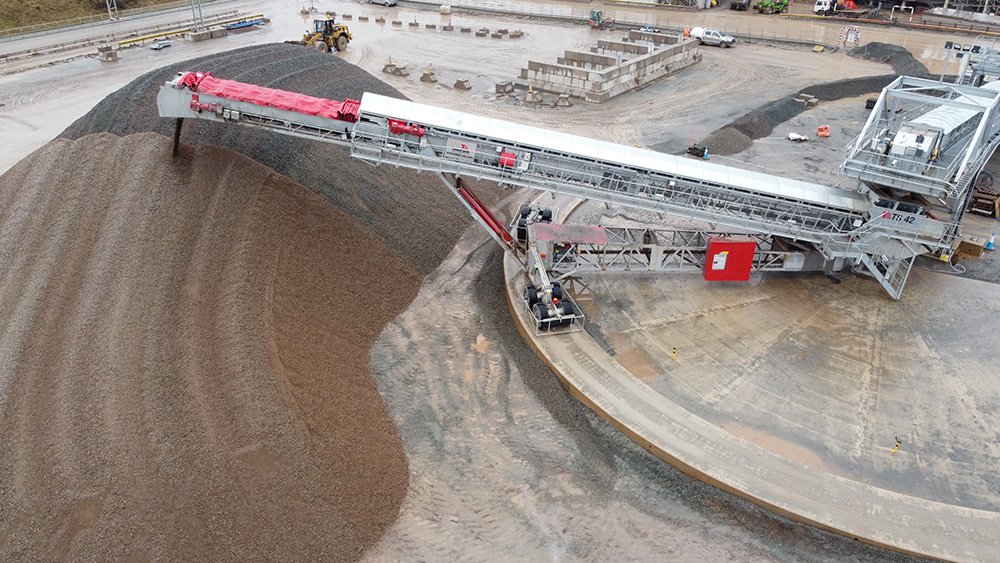
The smart stockpiling system starts at a low working angle, such as 8°, maintaining its lowest workable drop height throughout the operation as the stockpile increases in increments. This is compared to a fixed-length unit, for example, that would start at an 18° angle, thus wasting more energy to discharge the product at a greater height. This also results in a greater potential to compromise the quality of the product due to fracture and degradation caused by material dropping from the elevated operating height. The reduced power usage required for the radial telescopic conveyor ensures that less energy/fuel is used daily. Fuel consumption can be further enhanced by introducing an optional VSD (variable speed drive) by allowing the operator (remotely or locally) to increase or decrease the speed accordingly, depending on the operation's needs.
The continuous, autonomous stockpiling ensures that the blend of the product is maintained throughout the stockpile, and a higher quality product is achievable, ensuring the product is evenly mixed over a wide area. This helps to eliminate segregation, degradation, contamination and compaction, providing a higher-grade product for a lower stockpiling cost per tonne while reducing labour dependency and costs. There is also a big environmental gain of reduced traffic, dust and noise. The smart system also hosts a range of automatic sensors that guide the independent unit as determined in the set-up. These sensors, as well as safeguarding the drop height of the product, also ensure that the unit will pause when the material has stopped flowing. This ensures the integrity of the continuous stockpile structure, producing an ‘in-spec’ blended product. For example, this would be a significant factor for many in the aggregates sector, where product integrity is critical.
The Telestack range of radial telescopic stackers is available in lengths of 32m (110ft), 42m (140ft), 46m (150ft), 50m (170ft) and 58m (190ft) with possible stockpile capacities up to 200,000 tonnes at 270°. Stockpiling rates range from 100-3,000tph, and stockpile heights up to 20m (65ft) are easily achieved.
In addition, the option of several PLC automatic stockpiling programmes provides the operator with a versatile, economical and reliable stockpiling system that offers the ability for a radial windrow, incline windrow and radial-conical-stockpile formations, which in all provide a larger stockpiling potential and a radial-stockpiling potential of up to 270° for maximum stockpiling. The smart stockpiling system controls the unit's operation, gathers information, and sends it back to the central control station/ remote location. This helps to troubleshoot when issues arise, giving the controller operational information and specific status updates. In addition, the optional Telestack telematic system Telecore offers remote monitoring and support from the factory to enhance performance. This has proven critical in the operational performance and the unit's general maintenance. Particularly when labour was restricted, for example, during the recent COVID restrictions, the support from the factory was vital in supporting operations through challenging times.
A major UK customer recently purchased a TS-42 radial telescopic conveyor to stockpile aggregate/ scalpings at 1,000tph after a primary crusher and linking system. The fully galvanised conveyor had a host of environmental features, including galvanised dust covers the full length of the outer conveyor, a fully sealed transfer point from outer to inner conveyor, side wind plates on the inner with a retractable canvas cover on the outer conveyor, a spray-bar dust-suppression system and dual-access walkways for ease of maintenance as well as health and safety benefits. The customised discharge chute also helped eliminate and control dust emissions. This arrangement of dust-management options allowed the operation to satisfy the needs of the local regulations to mitigate potential environmental pollution. In addition, the ability to fully control the operation remotely (for example, from the central control station) means that the fully automated bulk-material-handling process enhances equipment efficiency and availability, ultimately increasing productivity and lowering operational costs.
The TS-42 installation has proven highly beneficial, and the customer has reported a significant improvement in the quality of the finished product. The benefits are also evident in the operational metrics achieving high throughput and a more efficient, productive, and safer bulk-materials-handling operation. The environmental improvements are also significant.
Specialists in the complete design, manufacture, installation and commissioning of mobile bulk-material-handling systems, Telestack has a globally proven record in a range of applications, including mining and quarrying, stockyard management, ports & inland terminals, power stations, rail yards, steel mills, cement kilns and many other bulk-material-handling industries and offers a range of solutions and reference sites along the logistics chain from pit to port to plant.
With its acquisition of the US-based Hendrik Group, Beumer Group, a conveying-technology major, is expanding its portfolio in bulk-material transport.
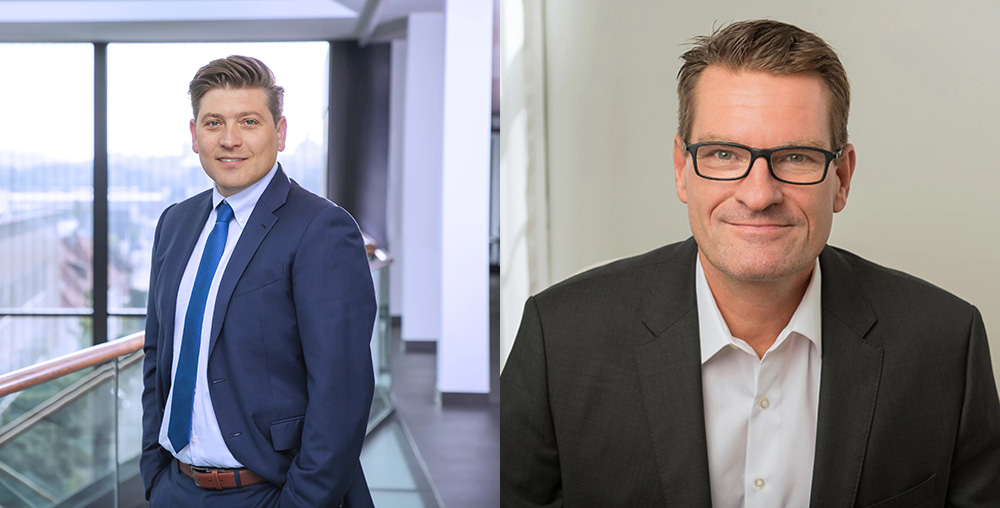
“The Hendrik Group specialises in the efficient and environmentally friendly transport of bulk materials. This aligns very well with our goals of bringing sustainable products to the market and improving our customers’ carbon footprint,” said Markus Schmidt, CEO of Beumer Corporation in Somerset, New Jersey, USA.
Founded in 1983 by Henk Hartsuiker and based in Woodbury, Connecticut, the Hendrik Group has become one of the leading manufacturers in the bulk-materials-handling industry with customers worldwide.
Operations manager Rik Hartsuiker believes that his father’s many years of experience and expertise in air-supported conveying technology are now in the best hands: “We hope my father’s legacy is safe in Beumer’s care and are confident that they will be as committed to the further development of air-supported conveying systems as we were.”
“In recent years, we have often had constructive discussions with the Hendrik Group about international cooperation in air-supported belt-conveying systems. The acquisition of this internationally successful company is the logical consequence of these constructive discussions,” said Kay Wieczorek, head of Beumer Group’s Centre of Competence (CoC) Product Business. “The qualitative expansion of our products is a great opportunity for us: we will continue to develop the groundbreaking technology of air-supported belt conveyors for our customers and in terms of sustainability.”
Global conveyor-belt and rubber-parts manufacturer Smiley Monroe has recently announced the move to a four-day week across its Northern Ireland production facilities.
Initially trialled within one production department in Lisburn, County Antrim, the shorter working week has now been rolled out company-wide and sees employees benefit from reduced working hours with no adverse impact on salary.
“Moving to a four-day working week is something we have aspired to for a long time,” comments Jayne Peters, Smiley Monroe’s director of People and Culture. “Employee satisfaction and wellness is at the core of our decision-making, and we have worked hard to put the necessary efficiencies in place to offer this to our team without impacting our output and, most importantly, our customers. We know that our employees will reap the rewards of an enhanced work-life balance and more time to spend with their families.”
The benefits of a four-day week have been well documented, with a 2022 UK trial of 70 companies seeing 86% of participants continue with the policy once the pilot ended. Positive results included happier, more productive employees, reduced stress and illness, savings on childcare and transport, and a reduced carbon footprint. Since the trial, more and more Northern Ireland companies are adopting this new way of working, with successful examples demonstrated within Smiley Monroe’s own customer base.
Smiley Monroe has industry giants such as Terex, Metso, McCloskey, Sandvik, Astec, Wirtgen Group and CDE among its customers. With three global production centres in Northern Ireland, the USA and India, Smiley Monroe targets £100mn in sales by the end of 2027 – three-fold growth in five years.
Chris Monroe, CEO of Smiley Monroe Group, said: “Our vision is to be the number-one partner across our material-processing and recycling world. For us, this does not just mean sales growth - it means being the best employer in our industry, the most sustainable choice for customers and the easiest to do business with. We are delighted to be one of the earliest Northern Ireland manufacturers to adopt the shorter working week, and we look forward to seeing our people thrive under the new scheme. We will continue to invest in the well-being and development of our team, and I am confident this will enable us, together, to achieve great things that will positively impact our business, our people and our communities.”
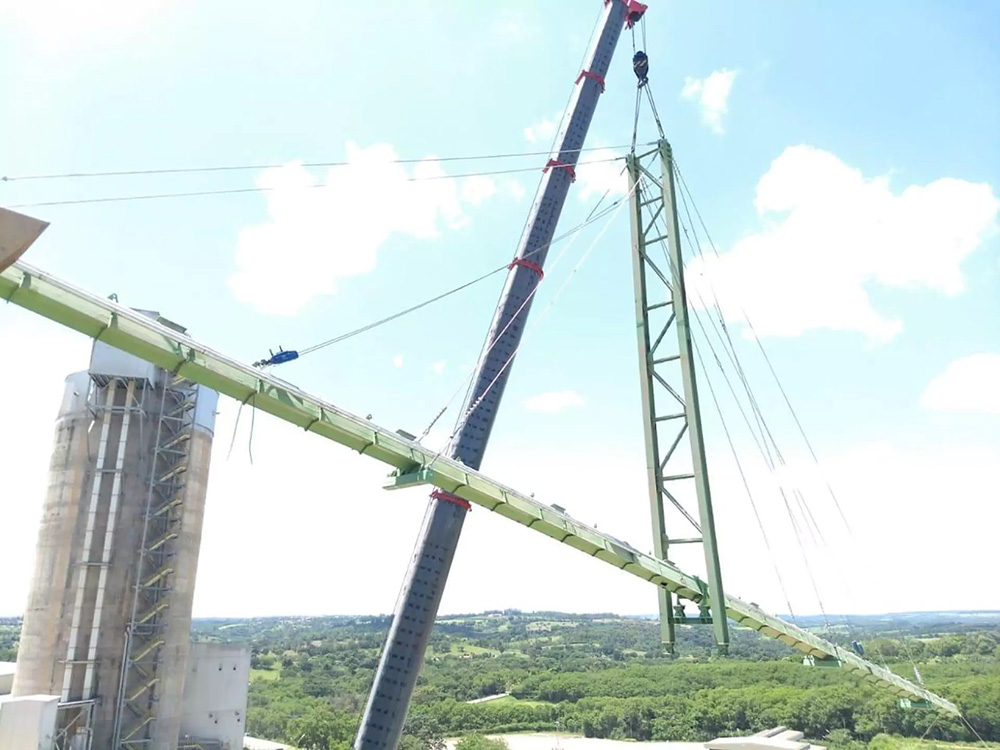
Bulk-handling accessories and safety company Martin Engineering is expanding its presence in the Asia-Pacific market by opening a business unit in Malaysia.
Headquartered in the capital city of Kuala Lumpur - with a satellite office in Lumut - the Malaysian business unit will act as the main hub to serve bulk-handling industries such as quarrying, cement, mining, ports, biomass and other sectors in the Asia-Pacific Region.
Martin Engineering says the benefit to customers will be more localised care from a team with a greater understanding of the region’s needs and challenges. It adds that this will result in faster response times, better logistics, closer customer relationships, and expanding the portfolio of products and services available to help customers improve their bulk-handling efficiency and safety.
“Our team in Australia has done a great job of serving this area, but we’ve come to realise that the Malaysian market deserves closer attention,” said Javier Schmal, the area vice president overseeing the expansion for Martin Engineering. “This is an exciting opportunity to give existing and new customers a greater range of bulk-handling options and innovations.”
The business unit will begin with six qualified collaborators, including experienced professionals like William Valladao from Martin Engineering Brazil. In addition to hiring more qualified local technicians, he will manage and improve support to key accounts and lead customer development. Valladao is a highly experienced member of the Martin Engineering operation. Having worked as a service manager for 20 years in Brazil, he was promoted to business development manager and, in five years, has earned the opportunity to build and drive the success of the Malaysian business unit.
The Malaysian team will speak several languages, including Malay, English, Portuguese, and Tamil.
“The Asia-Pacific market offers one of the best growth opportunities currently,” Schmal concluded. “This new business unit is part of Martin Engineering’s investment and strategic plan to improve our coverage and continue to offer the best service and customer support in the industry.”
The product offerings at the unit will include some of the company’s most popular cleaners, such as the innovative CleanScrape or the QC1+ Light Duty (LD) to Extra Heavy-Duty (XHD) models for superior belt cleaning to reduce carryback, dust and clean-up.
Improving the material flow and workplace safety, the Typhoon air cannons with SMART series nozzles allow external maintenance of valves and nozzle replacements without tank removal or exposure to high heat applications. Martin Engineering’s Malaysian team will also deliver fully engineered Total Material Control transition-point retrofits with belt sealing, dust control, belt tracking and belt support designed to improve the conveyor operations of customers throughout the region in any bulk-handling application.

